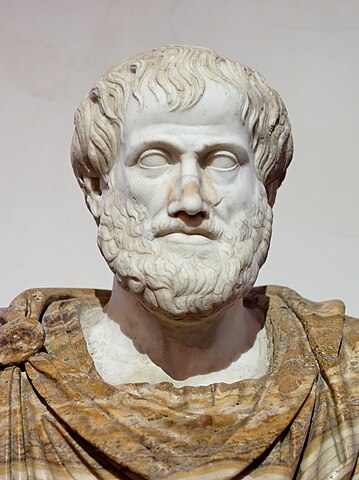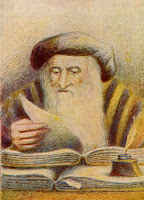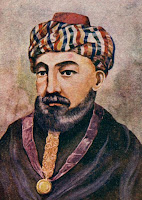The Greeks first entered Jewish history via the conquest of the Persian Empire by Alexander the Great, towards the end of their “Classical Period”. Historians refer to the period beginning with the death of Alexander the Great as the “Hellenistic Period”.
Origins of the Greeks
In Genesis 5:32 we are told that Noah had three sons, Shem, Ham, and Japheth. In Genesis 10 we read how these three men were the ancestors of all the “seventy nations” of humanity. Japheth had seven sons, one of whom was named Javan (יון – pronounced “Yavan”). According to Jewish tradition, Javan was the ancestor of the Greeks. Traditionally, the Jews have always referred to the Greeks as Yavanim rather than Hellenes, the name that the Greeks used for themselves.[1]
Although the Greeks viewed themselves as one group, bound together by bonds of blood, culture, and religion, they were far from being a unified people. On the contrary, all of Greek history is made up of constant wars between the different Greek states. It was only when confronted by the clear threat of the Persian Empire that the Greek nations were able to unite in mutual defense. Even this was only achieved with great difficulty and lasted for a very short time. Not long after the Persian conquest was defeated, the Peloponnesian war broke out between Athens and Sparta and their respective allies.
Eventually, the Greek states were united through the conquest of Philip of Macedonia. Macedonia was a semi-Greek state to the north of Greece. When Philip was assassinated, his son Alexander, whom we know as Alexander the Great, succeeded him. Alexander’s rise to power marks the beginning of a new era in world history.
Greek Wisdom
The Greeks were unique among the nations in their pursuit of wisdom and knowledge. The Maharal (R’ Yehuda Loew, d.1609) writes (ספר נר מצוה):
... מלכות זה [יון] כנגד ... השכל, שהמלכות הזה היה בו החכמה והתבונה ... כי כל ענין המלכות זה שהיו מבקשים החכמה...
This kingdom [Greece] represents the… intellect, for this kingdom had wisdom and understanding… for the entire theme of this kingdom was that they sought wisdom.
The Sages recognized Greek culture as being uniquely superior to other non-Jewish cultures. Thus, for example, the one language in which it was permitted to write a Torah scroll, other than Hebrew, was ancient Greek. The Mishna (Megilla 1:8) states:
...בספרים לא התירו שיכתבו אלא יונית
For [Torah] scrolls they only permitted Greek.
The Jerusalem Talmud (Megilla 1:9) explains:
בדקו ומצאו שאין התורה יכולה להיתרגם כל צורכה אלא יוונית
The [Sages] searched and found that the Torah cannot be properly translated in any language except Greek.[2]
The Talmud explains that this was a fulfillment of the blessing given to Japheth, the ancestor of the Greeks, by Noah (Genesis 9:27):
יפת אלקים ליפת וישכון באהלי שם...
May God expand Japheth, and he will dwell in the tents of Shem…
The Greeks were the creators of philosophy. Indeed, the term “philosophy” is a Greek word that means, “love of knowledge”. In ancient times, the term “philosophy” was applied to all forms of wisdom, including the sciences. However, and perhaps more importantly, Greek philosophy emphasized the study of the nature of the world, the definition of good and evil, and other basic questions about existence and humanity. It is in this regard that we use the term “philosophy” today.
Although the Jewish people did not engage in formal philosophical study in ancient times, the Greeks still recognized the Jews as being uniquely knowledgeable in these fields. As historian John G. Gager has written, "In the Greco-Roman world, the earliest and most abiding view of the Jews was as a nation of philosophers."[3]
The influence of Greek philosophy – especially the works of the greatest of the Greek philosophers, such as Socrates, Plato, and Aristotle – on human thought has been absolutely immense, extending even into modern times. Thus, it is not surprising that many later Jewish sources discuss the teachings of these philosophers at great length. While the Jewish perspective on Greek thought is often highly critical, even the most critical sources will generally acknowledge the intellectual achievements of these men. For example, Rabbi Yehuda HaLevi, a strong critic of both the philosophers and of philosophy in general, makes the following statement defending them in his
Kuzari:
[4]
הפילוסופים אין להאשים אותם, מפני שהם עם שלא נחלו חכמה ולא תורה....
ולפיכך, בדין הוא שלא נאמין לאריסטו בחכמתו, מפני שהטריח את שכלו ומחשבתו בעבור שלא היתה בידו קבלה ממי שיאמין בהגדתו... ואלו היה הפילוסוף באמה שינחל בה מקבלות ומפרסמות שאינו יכול לדחות אותם היה מתעסק בהקשותיו ומופתיו להחזיק החידוש – עם קשיו – כאשר החזיק הקדמות, אשר היא יותר קשה לקבל.
The philosophers should not be blamed [for their errors], for they are a nation that did not inherit wisdom and Torah…[5]
Therefore, we cannot have confidence in the philosophy of Aristotle. For he labored with his intellect and thought because he did not have a reliable tradition …. If the philosopher had lived in a nation [like the Jews] with reliable and well-known traditions that could not be falsified, he would have labored with his logical arguments and proofs to strengthen the concept of creation – with its difficulties – as he [instead] did with the concept of eternity, which is even more difficult to accept.[6]
Thus, R’ Yehuda HaLevi argues that the failure of the Greek philosophers to recognize the truth of creation and of God’s relationship with this world stemmed primarily from their exclusive reliance on their own intellect because they came from a nation with no reliable tradition of revelation. Indeed, the Kuzari (4:13, 5:14) later quotes Socrates making this very point:[7]
אמר סקראט אל העם, חכמתכם זאת האלקית אינני מכחישה, אך אני אומר שאינני יודעה, אמנם אני חכם בחכמה אנושית.
(ר"ל, מאחר שאין לי דת מקובלת, בדין הוא שאהיה נוטה אחר העיון האנושי – פי' אוצר נחמד.)
Socrates said to the nation [i.e. the leaders of Athens], “I do not deny your wisdom of god, but I simply do not know it, however, I am knowledgeable in human wisdom.”
(Meaning, “As I do not have a received religion [i.e. a religion based on a revelation and reliable tradition], it is only logical that I should turn towards human understanding.” – Otzar Nechmad)
Many traditional sources argue that the immense intellectual achievements of these Greek philosophers had to result from Jewish influence. Thus, for example, there are legends that Socrates received his wisdom from Ahitophel and Asaph haKarchi[8], and that Plato[9] received wisdom from the prophets, particularly Jeremiah.[10]
Aristotle
 |
| Aristotle |
The philosopher Aristotle was one of the greatest intellects of all time. His numerous works were all recognized as the authoritative works in their fields, and they covered every single area of human knowledge of that time. He wrote on the physical and biological sciences, on logic and mathematics, political science and psychology, art and poetry, and many other fields. His work was so influential that later generations treated his writings almost like holy script.
Aristotle was hired by Philip of Macedonia to tutor his son Alexander. Later, when Alexander became the king of Greece, and eventually most of the civilized world, he supported his former tutor, enabling him to found his own philosophical school in Athens and to engage in extensive research.
Jewish tradition has very mixed feelings about Aristotle. On one hand, Maimonides clearly had a very high opinion of Aristotle, writing:[11]
דעת ארסטו היא תכלית דעת האדם מלבד מי שנשפע עליהם השפע האלקי עד שישיגו אל מעלת הנבואה אשר אין למעלה ממנה.
The intellect of Aristotle was the ultimate intellect possible for a human being except for someone upon whom flows the Divine “flow” to the point that he achieves prophecy, above which there is no higher level.
Nevertheless, Maimonides was far from a slavish follower of Aristotle, especially when Aristotle’s conclusions differed from the Torah. Similarly, the Kuzari quoted above, and other sources, appear to see him as a basically honest and brilliant man who struggled to find the truth but failed due to his background. There is even a legend (almost certainly apocryphal) that, towards the end of his life, he became acquainted with the teachings of the Torah and recognized its truth.[12]
On the other hand, other traditional sources speak very negatively of Aristotle. For example, the Vilna Gaon (R’ Elijah of Vilna, d.1797) is quoted as saying "שודאי הוא שהיה אריסטו כופר מתחילה ועד סוף" – “It is certain that Aristotle was a denier from beginning to end.”[13]
The Rema (R’ Moshe Isserles, d.1572), in his work, Toras HaOlah (1:11), recounts a story of Aristotle which reflects the belief, mentioned previously, that Greek wisdom originally came from contact with the Jews, and which also puts Aristotle in a very negative light:
כתב בשבילי אמונה כי כל עיקר חכמת ארסטוטליס גנובה מחכמת שלמה ע"ה, כי כאשר כבש אלכסנדרוס מוקדן ירושלים, השליט לאריסטוטלס רבו על אוצר ספרי שלמה, וכל דבר טוב שמצא בהן כתב שמו עליו, ועירב בהן מקצת דעות רעות כמו קדמות העולם וכפירת השגחה לחפות עליו שלא ידעו הבריות שבאו אחריו שגנב החכמה מיהודי, ואפשר שכל דבר שלא מצא עליו מופת חותך בדברי שלמה לא האמינו
It is written in Shvilei Emunah[14] that the entire essence of the wisdom of Aristotle was stolen from the wisdom of [King] Solomon. For when Alexander the Macedonian conquered Jerusalem, he appointed his teacher, Aristotle, over the library of the books of Solomon, and every good thing that [Aristotle] found there, he wrote his name on, and he blended in some bad opinions, such as the [belief in] the pre-existence of the world and the denial of [Divine] providence, to cover himself so that the people who came after him would not know that he stole the wisdom from a Jew. And, possibly, anything in the words of Solomon which he did not find a clear proof for he did not believe.[15]
Interestingly, a number of works attributed to Aristotle were translated into Hebrew and were treated as valid sources of wisdom. In particular, Aristotle’s Nicomachean Ethics – known in Hebrew as Sefer HaMiddos – is particularly significant and widely cited.
Hellenism and Judaism
 |
| R' Samson Raphael Hirsch |
Rabbi Samson Raphael Hirsch (d.1888) writes
[16] that Hellenism serves a vital spiritual function in lifting man out of the pit of savage vulgarity and licentiousness that is symbolized by Ham, the raw, uncultured man. Only after man has developed the higher and nobler sensibility symbolized by Japheth is it then possible for him to turn to the even higher spiritual aspirations of Shem:
[T]he education of raw unrefined humanity ton the sense of beauty is not the highest. Wavering, unsettled is the culture which only gives Man the satisfying of his own higher standards as the criterion of the activities of his life, but gives him no ideal external to himself, glowing in its own lights, as a beacon, a goal and a criterion. Only that which can elevate the mind to a knowledge of, and the feelings to a recognition of what is good and true in itself, leads a man to the height of what he is meant to be. …
But… this goal will not be achieved at once. … Out of the raw, uncultured man, a cultured man has first to be made. The demand which the God of Shem makes is no small one, it demands the complete devotion and and submission of the whole person to God. A person must first acquire “the taste” of something higher than he is in his raw nature, even if this something higher is at first also something that appeals to his senses. … This culture of beauty and grace… is a precursor of the semitic mission, a preparatory school for teaching people to reach the loftier concept of life, the still greater beauty which lies in a harmonious joining all the aspects of life under the single idea of devotion to God.
[1] The Greeks were divided into three tribes, the Ionians, the Dorians, and the Aeolians. Of these three groups, the Ionians appear to have been dominant. In particular, Athens – the center of Greek culture and, for much of Greek history, the most powerful Greek state – was Ionian. Ionia is also the name given to a region of Asia Minor on the eastern shore of Aegean Sea that was settled predominantly by Ionian Greeks. The dominance of Ionians in Asia Minor would have brought them into more direct contact with the Persian Empire and the other Eastern centers of civilization. The Ionians were also the dominant group responsible for Greek philosophy and science. All of these factors may explain why the Greeks as a whole were known, by the Jews and others, as Yavanim. Interestingly, the Ionians claimed to be descended from a man name Ion. This individual may well be identical with Javan the son of Japheth.
[2] However, Maimonides (Hil. Tefilin 1:19) writes that the Greek language was corrupted in later years and can no longer be used for Torah scrolls.
[5] One of Rav Yehuda HaLevi’s basic teachings is the superiority of knowledge revealed by God (Torah) and passed down through a reliable tradition (mesorah) over knowledge found purely through human intellectual effort.
[6] In this paragraph, R’ Yehuda HaLevi focuses on what is possibly the most significant area of disagreement between the Torah and the philosophy of Aristotle. One of the most basic teachings of the Torah is chiddush ha’olam – that the world is created from nothing. Aristotle, however, taught kadmus ha’olam – that the world has always existed. It should perhaps be noted that the Abarbanel, in his Mifalos Elokim (5:3) argues that Aristotle, in making this argument, did not intend to argue against the Torah teaching that the world was created by supernatural means, but against other Greek schools of philosophy which believed that the world had come into existence by natural means.
[7] I do not know what R’ Yehuda Halevi’s source was for this quote, however, while not made explicitly, the sentiment is echoed in a few passages in
Plato’s Apology, in which Socrates defends himself against accusations of heresy and atheism.
[8] Seder HaDoros (ג"א שפ"ה)
[9] Plato’s philosophical system, in particular, has a strong resemblance to concepts in Torah, particularly Kabala. A note printed in the beginning of the Tikkunei Zohar im Biur HaGra states:
חכמת הקבלה היא חכמת רוחניות התורה ושרשיה, כפי שבאה בקבלה לראשי האומה, והאור האלוקי הזה הופיע גם באהלי יפת, וגדולי חכמי יון נאותו לאור יקרות זה, והתקרבו במקצת דעותיהם לדעות חכמי הקבלה, וביחוד הפילוסוף אפלטון היוני...
The wisdom of kabala is the spiritual wisdom of the Torah and its roots, as it was received by the heads of the nation. This godly light also shown in the tents of Japheth, and the great sages of Greece enjoyed this precious light and came close, in part, to the opinions of the sages of kabala, especially the philosopher Plato the Greek.
[10] The Shalsheles HaKabala (R’ Gedaliah ibn Yachya, d.1588) makes the following statement:
קבלתי ממורי הגאון זקני זצ"ל כי הוא ראה בפי' הכוזר שעשה ר' נתנאל ן' כספי האומר אמר אפלטון אני הייתי עם ירמיהו במצרים ובתחלה הייתי לועג עליו ועל דבריו ולבסוף כאשר הרגלתי לדבר עמו ולדקדק במעשיו וראיתי כי דבריו דברי אלקים חיים אז אמרתי בלבי וקיימתי שהוא חכם ונביא
I received from my teacher, the gaon, my grandfather זצ"ל, that he saw in the commentary on the Kuzari written by Rav Nasanel ibn Kaspi (early 15th century) a statement quoting Plato saying, “I was with Jeremiah in Egypt, and in the beginning I mocked him and his words, but in the end, when I spoke to him regularly and carefully observed his deeds, I saw that his words were the words of the living God. Then I said in my heart and I determined that he was a sage and a prophet.”
(Page 137 in 1889 Warsaw edition.) Also see Seder HaDoros ג"א ש' and Midrash Talpiyos ענף ירמיה.
[11] Near the end of a letter he wrote to Rav Shmuel ibn Tibbon on the translation of Moreh Nevuchim.
[12] The Shalsheles HaKabala writes that a book was found, supposedly written by Aristotle, in which Aristotle recanted from all of his philosophical teachings and acknowledged the truth of the Torah. The Shalsheles HaKabala then goes on to quote at length from a letter, appended to this work, which Aristotle supposedly wrote to his disciple, Alexander the Great, in which he writes that he met a Jewish sage who proved to him the truth of the Torah and that he now wishes he could destroy all of his earlier works. Seder HaDoros even quotes a source that claims that Aristotle converted to Judaism!
[13] הקדמת ר' מנחם מענדל משקלאב לפי' הגר"א על מס' אבות – This statement may have been specifically intended to contradict the legends of Aristotle’s later change of heart.
[14] By Rav Meir ibn Aldabi (14th century).
[15] This last sentence is not from the Shvilei Emunah, but from the Rema. It appears to be an attempt to partially justify Aristotle’s mixture of false teachings into the wisdom of Solomon, similar to the argument of Socrates quoted from the Kuzari previously.






